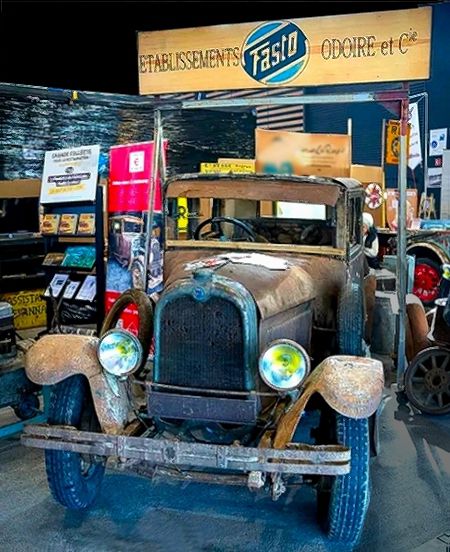VIEW AT EPOQUAUTO 2023THE EPOPE OF FASTO A2 A RESURRECTED TREASURE | |
This old car, enigmatic and little known to the general public, stands out as the only example still existing to our knowledge, a rare testimony to a bygone era. The FASTO A2, produced in the Saint-Éloy-les-Mines and Saint-Ouen workshops between 1926 and 1929, embodies the creative spirit of the interwar period. This period, marked by the ephemeral emergence of numerous automobile brands, saw the FASTO shine both on the circuits and on the commercial market. The FASTO adventure began in 1924 in Saint-Éloy-les-Mines, with the production of the first automobiles in 1926. Going against the trends of the time, the decision was made to build the car in its entirety, including the engine. The first models were created under the aegis of the Odoire et Cie establishments in Sainte-Éloy, before being assembled in Saint-Ouen from the end of 1926. The FASTO A2, the prototype succeeding the A1, stands out for its closed design and its 1,600 cc, 4-cylinder engine, developing 25 horsepower. The C1 model chassis was briefly presented at the Paris Auto Show in 1926, but remained unsuccessful. The following year, the A3 debuted with a new 1,600 cc overhead cam engine, boosting power to 35 horsepower. That same year, three A3 S models equipped with 2-liter engines were prepared for the 24 hours of Le Mans, offering FASTO a prestigious showcase despite mechanical setbacks on the track. In 1927, the A4 joined the catalog, unveiling a less efficient version of the A3. Unfortunately, the FASTO adventure came to a premature end in 1928/1929, at the dawn of the Great Depression, putting an end to a promising but short-lived automobile epic. Nearly a century later, the Associative Group of Technical Heritage Collectors (GACPT) took the initiative to revive the FASTO A2. Under the direction of Lionel Duperray of Éditions Vals d'Allier, a committed publishing house, a work has seen the light of day. The profits from its sale are entirely dedicated to the restoration project of the last known example of the FASTO A2, today in the hands of the GACPT. The history of FASTO, recounted in this work prefaced by Franck Mesnel, former rugby player for the French team and co-founder of the Eden Park brand, takes on a new dimension. Franck Mesnel, grandson of Pierre Mesnel, the driver of Fasto number 8 during the 1927 24 hours of Le Mans, brings a personal touch to this forgotten saga. Today, FASTO cars are almost impossible to find, having fallen into obscurity even at vintage vehicle gatherings. However, destiny decided otherwise, and it is in the suburbs of Lyon that an A2 model resurfaces, testimony to a bygone era. Used as a family car until the mid-1950s, it then sank into oblivion, spending many years in a damp underground garage, leaving its state of conservation in poor condition. Faced with a probable destiny towards scrap metal, the GACPT, based in Givors, manages to divert FASTO from its final journey, making the association the guardian of the last known example among the 15 produced. Thus, the GACPT is embarking on an ambitious project: the complete restoration of the FASTO A2. This arduous task, equivalent to a real reconstruction, involves in-depth technical investigations with a view to remanufacturing the missing parts. The estimated cost of the work is 180,000 euros. Raising the necessary funds becomes imperative, and this is where a committed publisher comes in, proposing the creation of a book dedicated to this exceptional car. The royalties generated by the sale of this book will be entirely donated to the association. In addition, for generous donors wishing to contribute to saving this unique automobile heritage, the Heritage Foundation automatically provides tax credits. The commitment to the FASTO A2 does not go unnoticed, and the Motul Foundation, famous oil manufacturer, is already supporting the project with a generous grant of 10,000 euros. However, the call for mobilization does not stop there. Automotive history enthusiasts, heritage defenders and all those who wish to participate in this adventure are invited to join this preservation process. At the heart of this epic, the GACPT, with its address at 2348 route de Mornant, 69700 Givors, embodies the spirit of preserving technical heritage. Likewise, Éditions Vals d'Allier, located at 31 rue du Docteur Dumas, 63300 Thiers, stands out for its contribution to the dissemination of historical and heritage knowledge. The FASTO A2, a poignant testimony to a bygone era, is reborn thanks to the collective effort and commitment of enthusiasts. The restoration of this unique piece promises to be a captivating odyssey, where the history of the FASTO will regain its splendor and its place in the rich panorama of French collector's automobiles. By contributing to this noble cause, each participant becomes a link in a chain aimed at preserving automotive heritage for future generations. Let's raise our eyes to the FASTO A2, silent witness to a bygone era, and engage in this quest to bring it back to life. |
|
| Andrew Preston and Patrick Mourreau for DayNewsWorld | |
 |
|






